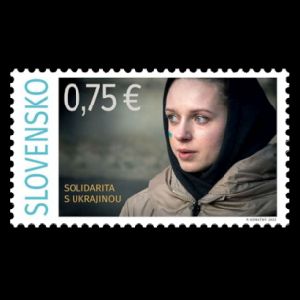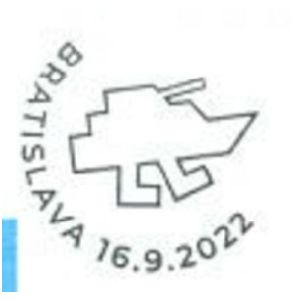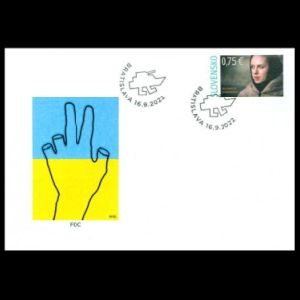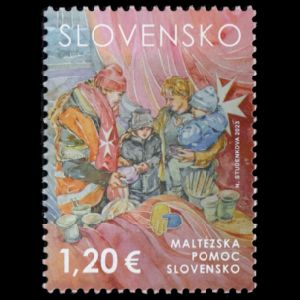|
Slovakia
Philatelic materials related to Ukrainian resistance to Russian aggression
| << previous country | back to index | next country >> |
Contents:
- Country overview
- Philately of Slovakia
- Official stamps of Slovakia related to Ukrainian resistance to Russian aggression through Philately
- References
Slovakia, officially the Slovak Republic is a landlocked country in Central Europe.
It is bordered by the Czech Republic and Austria to the west, Poland to the north, Ukraine to the east and Hungary to the south.
Slovakia's territory spans about 49,000 square kilometers and is mostly mountainous. The population is over 5 million and comprises mostly ethnic Slovaks. The capital and largest city is Bratislava.
After the dissolution of the Austro-Hungarian Empire at the close of World War I, the Slovaks joined the Czechs to form Czechoslovakia.
During the interwar period, Slovak nationalist leaders pushed for autonomy within Czechoslovakia, and in 1939 Slovakia became an independent state allied with Nazi Germany.
Following World War II, Czechoslovakia was reconstituted and came under communist rule within Soviet-dominated Eastern Europe. The peaceful "Velvet Revolution" swept the Communist Party from power at the end of 1989 and inaugurated a return to democratic rule and a market economy.
On 1 January 1993, the country underwent a nonviolent "velvet divorce" into its two national components, Slovakia and the Czech Republic. [R1]
From 1918 to 1939 stamps of the Czechoslovak Republic were in use on Slovakia, marked either Česko-Slovensko or Československo.
Before then stamps of the Austro-Hungarian Empire were in use. Slovakia was part of Czechoslovakia between May 1945 and 31 December 1992, and Czech stamps were used during that time.
Since 1 January 1993, Slovakia became independent again as the Slovak Republic after splitting from the Czech Republic and stamps were issued from that date inscribed Slovensko as they had been between 1939 and 1945. Stamps of the former Czechoslovakia continued to be valid until 30 September 1993.
Since strat of Russian invasion in Ukraine on February 24th 2022, Slovakian post stand with Ukraine.
From 23rd March 2022 Slovenská pošta, a.s. offers the opportunity to send a humanitarian aid parcel to a specific address in Ukraine for free. The Ukrainian postal service has promised to give priority to their delivery. [R2]
Official Philatelic materials of Slovakia related to Ukrainian resistance to Russian aggression
| 16.09.2022, "Solidarity with Ukraine" (in Slovakian „Solidarita s Ukrajinou“) MiNr.: , Scott: [1] | ||
 |
 |
 |
| 23.06.2023, "Joint Issue with Sovereign Military Order of Malta" MiNr.: , Scott: [2] | ||
 |
 |
 |
Notes:
[1] On September 16 2022, the Post of Slovakia issued the stamp "Solidarity with Ukraine". The stamp has the face value of €0.75, printed in Sheets of 50.
The stamp captures the portrait of a weeping Ukrainian refugee who has found asylum in Slovakia. The postmark depicts a walking ship, a metaphor for a sunken Russian warship near Snake Island, created by Slovakia-based Ukrainian artist Mykola Kovalenko.
From the beginning of the conflict, more than 700,000 Ukrainian citizens have crossed the Slovak border.
The majority have been women and children looking for a safe haven.
Many of them have travelled onwards beyond Slovakia, moving on to other countries,
but more than 90,000 have asked for protection from the Slovak Republic.
At the border, local governments and non-governmental organisations, supported by hundreds of
dedicated volunteers, did a lot to support them as they crossed into Slovakia.
The provision of accommodation, food, medical care and an education for children showed our growing
willingness to help and this is a highly positive entry on Slovakia’s report card: as positive as
the supply of weapons that contributed to the collapse of the aggressor’s plans for a quick victory.
This spontaneous support for a democratic Ukraine, seen in demonstrations attended by many of our
citizens in many cities throughout Slovakia, has raised the hopes of the refugees that the time will
come when they will be able to return to their free homeland.
[2] The Sovereign Order of Malta is an institution with two identities. On one side it is an order of the Catholic Church, established in 1113, and on the other it is an entity governed by international law that maintains diplomatic relationships with 112 states and the EU. It is not a member of the UN but has Permanent Observer status. The Order of Malta is neutral, impartial and apolitical.
The Sovereign Order of Malta has been active in 120 counties throughout the world. It provides a helping hand to those in need through the provision of healthcare, social, and humanitarian projects. The order operates a number of hospitals, healthcare centres, schools and institutions that provide professional assistance. The priority of the order is the protection of human dignity and the provision of assistance to those in need, regardless of their nationality, race or religion.
 |
| Stamp of the Sovereign Order of Malta 2023 |
 |
| Souvenir Cover of the Sovereign Order of Malta 2023 |
The Order's modern postal administration, known as the Poste Magistrali, was instituted on 20 May 1966
under a Decree of the Grand Master, and post offices were established at Palazzo Malta and Villa
del Priorato di Malta in Rome.
The stamps are inscribed Poste Magistrali and bear one or more small Maltese Crosses.
Early issues were printed by De La Rue, but today a variety of Maltese and Italian printers are used.
As well as postage stamps, the Order has produced aerogrammes, maximum cards, first day covers, miniature sheets,
due stamps and postcards with imprinted stamps.
The Order is not a member of the Universal Postal Union, however it has
bi-lateral postal agreements with some countries in which the order does charitable work.
The stamps of the Sovereign Order of Malta are usually classed as cinderella,
rather the postage stamps.
The charitable projects run by the Order of Malta in Slovakia are organised by Malteser Aid Slovakia. More than 120 trained volunteers participate and its permanent projects provide assistance to the elderly, handicapped and homeless people as well as to refugees.
Therefore, the postage stamp, released to commemorate the 30th anniversary of the establishment of bilateral relationships between Slovakia and the Sovereign Order of Malta, was inspired by the self-sacrifice of the volunteers who provided assistance after the outbreak of war in the Ukraine. Volunteers from Malteser Aid Slovakia arrived at the Slovak-Ukrainian border crossing in Vyšné Nemecké as early as the second day of the Russian attack. More than 200 volunteers provided healthcare, social and psychological aid 24/7 for several months.
The assistance provided to those affected by the conflict includes more than 130t of humanitarian supplies for the Ukraine, accommodation facilities for 160 Ukrainian mothers and their children, the distribution of food vouchers to hundreds of Ukrainian pensioners and handicapped people, and integration activities to help Ukrainian pensioners.

|
References
- [R1] Slovakia:
Wikipedia,
Flag Counter
- [R2] Postal History and Philately of Slovakia:
Wikipedia,
Slovakian Post help for UKraine,
Links to official website of the Post Authority, stamp catalog and a list of new stamps of Slovakia are here. - [R3] "Solidarity with Ukraine" stamp from 2002: POFIS, Slovak Spectator.
| << previous country | back to index | next country >> |